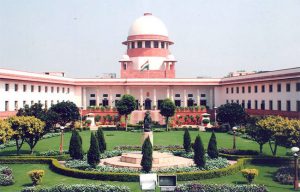
Janjivan Bureau
New Delhi : Supreme Court on Monday prohibited politicians from using religion and caste to garner votes, a verdict that could force political parties to change their strategy in upcoming elections.
“No politician can seek vote in the name of caste, creed or religion,” said Chief Justice T.S. Thakur in an order, adding that election process must be a “secular exercise”.
India is officially secular but political parties have traditionally used religion and caste as the main criteria to select candidates and to appeal to voters.
Prime Minister Narendra Modi’s ruling Bharatiya Janata Party (BJP) has for years fought elections on a Hindu nationalist agenda, with party members in the past being accused of making anti-Muslim statements to polarise Hindu voters.
The court ruling comes just weeks ahead of a state election in Uttar Pradesh, India’s most populous state where the two issues of religion and caste generally dominate campaigns.
Results of the election will be important for Modi’s expected bid for a second term in 2019.
State elections are also due this year in the states of Punjab, Uttarakhand, Goa and Manipur.
The Supreme Court, ruling on a petition filed by a politician in 1996, wrote in its opinion that the secular ethos of the constitution had to be protected.
The majority view of the seven-judge Supreme Court bench held that elections would be void if a politician made an appeal for votes on the basis of religious sentiment.
VHP today welcomed the Supreme Court ruling today barring political parties and candidates from seeking votes in the name of religion, caste, community, race or language.
Welcoming the decision of the Supreme Court, Vishwa Hindu Parishad’s Joint General Secretary Surendra Jain said politics based on caste, community and religion has harmed the country a lot.
He also said that national integration has also been damaged by this practice.
“Vote bank politics would be curbed by this decision and the judgement will prove to be a landmark in nation-building,” he said.
Jain said it is now the duty of the Election Commission to get it implemented in its letter and spirit.
“We appeal to the Election Commission to de-recognize the political parties and debar the candidates who violates any provision of this verdict,” he said.
In a landmark verdict seeking to separate religion, caste and other issues from politics, the Supreme Court, by a majority verdict, today held as “corrupt” the practice of candidates appealing for votes on the basis of these identities included not only him but his agents and voters.
Congress today welcomed the Supreme Court decision which outlawed seeking votes in the name of religion, saying it reaffirms the fundamental values on which the nation was founded.
Asked about the judgment, Congress spokesperson Manish Tewari said the question should have been best directed at the BJP.
“But, on a more serious note, it is an excellent decision, it is a decision which should be welcomed by everybody,” he said.
Tewari said the decision reaffirms the fundamental values on which this Nation was cast by the founders of the Indian Constitution.
These fundamental values are: to build an egalitarian society, to build a society which is above caste, creed, region, religion or faith; to have a clear separation between religion and State, he said.
He said these lines have blurred in the march of this country over the last 67-68 years.
“So, therefore, every right-thinking Indian must welcome it. Why should religion, caste, region or every other parochial instinct be invoked in order to garner votes in a democracy, it is the complete anti-thesis of those noble values on which this country was built and therefore, Hon’ble Supreme Court’s decision is more than welcome,” he said.
In a majority 4:3 verdict, the Supreme Court today held that any appeal for votes on the ground of “religion, race, caste, community or language” amounted to “corrupt practice” under the election law provision.
Referring to the term ‘his religion’ used in section 123(3) of the Representation of The Peoples (RP) Act, which deals with ‘corrupt practice’, Chief Justice T S Thakur and three others said it meant the religion and caste of all including voters, candidates and their agents etc.
In its ruling in a case related to the election of a Shiv Sena leader, the Supreme Court had in 1995 said Hindutva is a “way of life and not religion”.

















